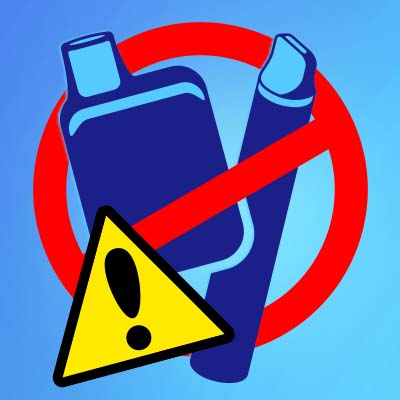Glastonbury Festival Banned Disposables And It Didn’t Work
Every year tens of thousands of disciples head up to Somerset to experience 6 days of rough camping, questionable food and arguably some of the greatest musicians on the planet. Since its inception, Glastonbury Festival has marketed itself as the “alternative event of the year” in the musical calendar.
No strangers to green policies, visitors are encouraged to leave nothing behind and consider eco-friendly options for everything from camping equipment to food. Their latest edict couldn’t be more timely, the organisers announced a ban on disposable vapes. Citing concerns about the environment and litter, guests were encouraged to leave their disposable vapes at home or face the risk of confiscation.
Now, music festivals have a long history of smuggling, with everything from baby wipes to mind-bending flora and fauna being snuck in. But, when it came to vapes, people were a little more brazen. I was lucky enough to attend this year’s event (if you can call paying £15 for a chicken burger, lucky) and I’m here to tell you that vapes were everywhere and the disposable was king.
While standing in the queue to get in, having been up since the wee hours, I took a moment to look around the green and pleasant land that would soon be destroyed by thousands of pairs of Hunter wellies and mud-caked Nike Air Maxes, and was hit square in the face by a plume of blue raspberry – what a wake-up call! The vapour emanated from a large disposable. I wasn’t close enough or brave enough to ask whether this was one of the millions of illegal vape devices that have flooded the UK, but 10 years of industry experience means I know a disposable when I see one. Still, we weren’t actually in the venue yet, so no harm, no foul.
On day two, after being kept up until 3AM by the type of drum and bass that’s normally only used for torturing political dissidents, I took a walk and tried to get my bearings. It wasn’t long after that I started looking at the ground – never make eye contact at a festival, people will assume you want to talk to them – and presented like recently unearthed archaeological finds were disposables from the usual suspects.
While event organisers had gone to great lengths to include recycling bins for food, cardboard and plastics – there was nothing in place for electrical waste. This struck me as weird because it was reported that the festival did offer options for the disposal of other illicit items (the kind that makes you want to listen to the aforementioned drum and bass).
Why Didn’t The Glastonbury Disposable Vape Ban Work?
The ban didn’t work for the same reason any ban doesn’t work, a lack of enforcement. Good intentions and sweeping declarations do very little to change the habits of people looking to have a good time - and this includes satisfying a nicotine craving. There was a police presence at the festival, although limited, and this still didn’t act as a deterrent. Neither did the random stop-and-search tactics used at the gates.
Glastonbury could be treated as a test case for the success of a disposable ban, as under current legislation there is no concrete plan as to how future governments are going to enforce it. While we did come up with a solution – a dedicated vape licensing scheme – its implementation is still being debated. Take this festival as a lesson, a ban without enforcement is about as effective as blocking out the sound of thousands of festival-goers with a canvas tent.
However, that was the old government. Will this “new dawn” of Labour-led politics also herald the arrival of a new approach to vape legislation? Party members such as Wes Streeting have been more open to vaping, calling it “a useful smoking cessation tool” but will this translate to policy? The prospect of a disposable ban still looms and with it the potential for further heavy-handed legislation. Hopefully, Glastonbury offers an important lesson, but we shall wait and see.
Share This Guide




